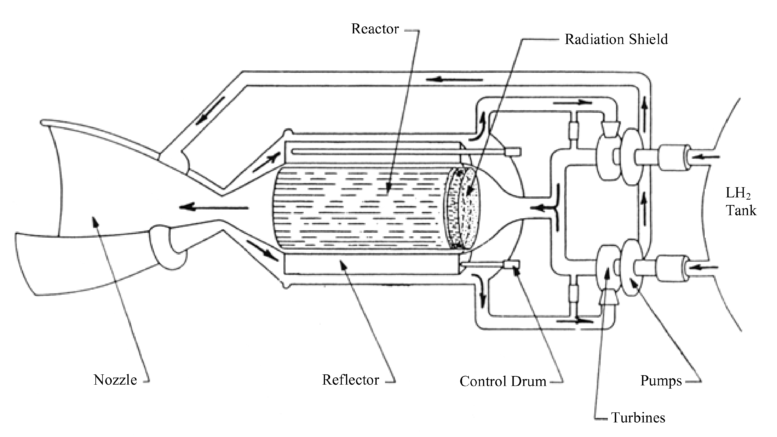The idea of using a nuclear rocket to fly to the stars has been a fascination to space agencies since the beginning of spaceflight. The idea has taken many forms throughout its different lifecycles and every generation seems to have its own nuclear rocket proposal that is different. That said, we will be talking about the the benefits and potential issues on the topic in general details. The history of nuclear rockets is really fascinating, but something that we will discuss in another article. Here is just an overview of nuclear rocket considerations
Benefits
Nuclear rockets have higher specific impulse. Therefore, one would get to Mars faster than any other currently available technology. Moreover, other benefits include the lack of fossil fuels and that there is the potential that a smaller amount of fuel goes further. The smaller amount of nuclear fuel would save weight; therefore, allowing for either more cargo to be carried to space or have a generally smaller rocket.
Production
For those producing all of the parts of the nuclear rockets, there would need to be some safety to protect the workers from the amounts of radiation thy would receive daily. Although a greater percent of the design and building work can be done via computers or robots, there would still lead to disposal issues. Plus, there would still be the need for humans to transport the rockets accordingly for assembly.
Storage
Storing nuclear material can be tricky both on the ground waiting for launch and on the spaceship. The US and other national governments already have trouble storing spent nuclear fuel. Therefore, the idea of storing nuclear rocket fuel would also be an issue. Moreover, storing the nuclear fuel on the rocket would have to be done in a way that doesn’t leak nor does it interact with the astronauts. The astronauts on the mission with the nuclear fuel will need to be safe and not have radiation poisoning, which could make the astronauts ill and could lead to death.
Testing
How does one test a nuclear rocket and handle the results? Even if successful, the result of degree would have to be limited. Considerations include preventing nuclear fallout in the event of a failure, having the spacecraft debris be destroyed in the atmosphere before returning to earth, and also how to limit radioactive exposure to the testing facility.
Legal Issues
The reason for the legal issues with governments is the Partial Nuclear Test Ban Treaty signed by the US and Russia during the Cold War. That treaty prevented the use of nuclear weapons in space and under water. With the rise of private space companies, this might complicate the legal issues of nukes in space because no longer are national governments using nuclear rockets, but rather private companies are.
References And Further Reading
https://www.lanl.gov/science/NSS/issue1_2011/story4full.shtml

Be the first to comment on "Nuclear Rocket Issues"